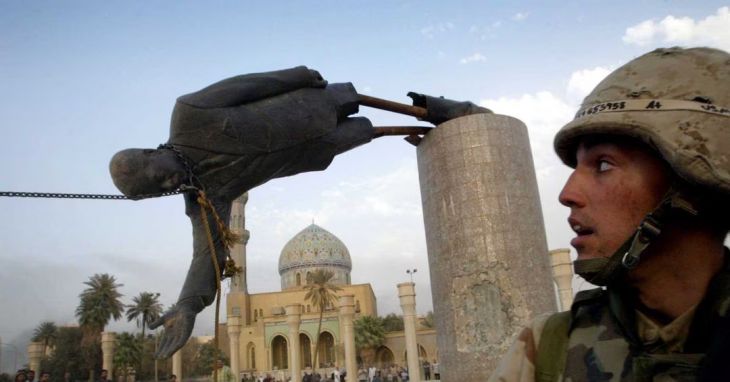Twenty years ago this month, the United States embarked on one of the most egregious geopolitical mistakes in its history.
The invasion of Iraq was based on erroneous assumptions, poor intelligence and weak strategic analysis and the result has been catastrophic for Iraq and, some might say, for the world.
President George W. Bush assumed the presidency in January 2001, and I believe that he was consumed with the desire to overthrow Iraq’s dictator Saddam Hussein for personal reasons related to the first Iraq war -- the impact his father’s decision to not topple Hussein in 1991 had on his defeat at the hands of Bill Clinton in 1992, and Hussein’s attempted assassination of the elder Bush in Kuwait in 1992.
“W”, as he came to be known, was aided greatly by Vice-President Dick Cheney and Defense Secretary Donald Rumsfeld – both of whom were associated with Halliburton, an American oil services giant. They sought to have Halliburton assume direct control of Iraq’s oil fields after a victory as a way to fund the invasion. Cheney had been President of the company prior to becoming U.S. Vice-President in 2001.
Sometimes, things don’t go as planned.
Immediately after the attacks of 9/11, word came down from the White House to the CIA to find an Iraqi connection to Al Qaeda and the terrorist attack that took over 3000 lives. The CIA was also tasked with finding a suspected Iraqi program to produce weapons of mass destruction.
This culminated with Secretary of State Colin Powell’s testimony before the U.N. Security Council during which he showed a vial of what he said was powdered uranium that Hussein was using in his development of nuclear weapons.
Despite these initiatives, the Security Council voted against a UN mandate for an invasion. While some NATO members like the United Kingdom and Spain joined the “Coalition of the Willing”, others, like Canada, opted out - a risky yet courageous move that left them on the right side of history.
The war dragged on for 8 years until the U.S. withdrew in 2011, only to return in 2014 to confront the rise of ISIS – a terrorist group that grew out of the Iraqi Sunni resistance to the invading U.S. forces. Over 300,000 Iraqis died in the process, and many thousands more under the ISIS dictatorship that occupied much of Iraq and parts of Syria for four years.
As well, over 8000 U.S. soldiers died during the war, and 20% of soldiers who served returned home with PTSD.
Iraq has never really recovered. It is now comprised of three main regions: the Kurds in the north, the Sunnis in the center, and the Shiites in the south. It is a weak union and has a weak government.
While ISIS has lost the territory it occupied and governed between 2014 and 2018, its sleeper cells across the Muslim world and in the West continue to cost thousands of lives every year. Its tentacles are spread across the Muslim world from Indonesia to Morocco, and into sub-Saharan Africa. It has been responsible for destabilizing a number of governments in Africa, and some major terrorist actions elsewhere.
W’s decision to invade Iraq drew the bulk of U.S. forces away from Afghanistan where it had led the U.N. coalition in the hunt for Al Qaeda and its leader, Osama Bin Laden, who was only killed by U.S. forces during the Obama administration in 2011. The U.S. drawdown and eventual withdrawal from Afghanistan in 2021 allowed the Taliban to regroup and mount a counter insurgency that eventually led to its return to power that year.
Iraq and Afghanistan remain two major stains on American military and foreign policies. The world is in a far worse place than it was in 2001, and the only winner appears to be Iran. Saddam Hussein’s regime had acted as a bulwark against Iranian expansionism. Now Iran has a sphere of influence whose arc ranges from Teheran to Lebanon through Iraq, war-torn Syria, and Hezbollah occupied southern Lebanon.
While Saudi Arabia had led the Sunni Arab resistance against Iranian influence, the recent peace agreement between Iran and Saudi Arabia brokered by China has changed the Rubik’s cube of Middle East relationships. It has established China as a power broker in the region at the expense of U.S. influence and prestige.
Can the U.S. recover its former position in the region?
This is a valid question.
The invasion of Iraq may not be directly responsible for the current geopolitical situation. But the continuing strength of ISIS, the growth of Iranian influence in the region, the overall futility of the invasion of Iraq and the anti-U.S. sentiment it spawned across much of the region may well continue to impact American prestige and influence in that part of the world.
[email protected]
Keep reading: Uganda: Gay Rights Under Attack
Edición: Laura Espejo
Prueba del Inmegen puede ubicar hasta 3 mil mutaciones neoplásicas
La Jornada
Esperan el regreso de Adulfo Camacho (tercera base) y Salvador Garibay (bulpén)
Antonio Bargas Cicero
'La Hormiga' logra gol y asistencia; también marca Jesús Gallardo
Ap
El presidente llevó papeles a su mansión luego de su primer periodo como gobernante
Afp
